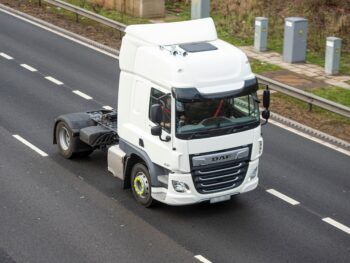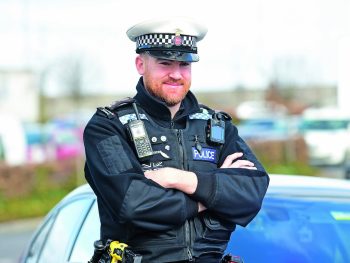National Highways marks decade of Operation Tramline with shocking new footage of driver offences
National Highways is marking 10 years of its Operation Tramline road safety initiative by releasing footage of the latest shocking unsafe driving offences captured by police.

More than 51,500 offences have been recorded by the Operation Tramline scheme in the last decade
It’s now a decade since the first unmarked HGV cab went out on patrol with the police under a trial to find new ways to deter unsafe driving.
Since then, more than 51,500 offences have been recorded by the Operation Tramline scheme and some 13,000 hours have been racked up through officers from 35 different police forces patrolling across the country in unmarked cabs.
There are now three unmarked HGVs available to police partners, who can take advantage of the elevated position to see into cars and vans or across into lorries.
New footage released today reveals three drivers spotted without their hands on the wheel and using their mobile phones when Surrey Police patrolled in the National Highways HGV cab last month, 10 years after their first outing.
National Highways has also spotlighted 10 of the most shocking offences witnessed in Operation Tramline over the last decade, which include:
- People eating takeaways, a driver scoffing a bowl of cereal at the wheel in North Yorkshire and someone tucking into lasagne with a knife and fork while driving
- A woman driver applying her makeup while travelling along the M40 in the Midlands
- A driver steering a vehicle transporter with just his elbows along the M40 in Warwickshire.
- Drivers using two mobile phones at a time and one that was placing an online order with a phone in one hand and holding their credit card in the other.
- A driver playing with a Rubik’s Cube while manoeuvring through M25 traffic
- Three HGV drivers from the same company were caught using their phones while driving during a week of activity.
- And a driver in Surrey defended their use of a mobile phone while driving saying that they had a new girlfriend and that their song came on the radio, so they needed to call them.
The most common offences recorded over the last decade are not wearing a seatbelt (14,861) and using a mobile phone (13,553). Together these offences make up over half (54%) of the total number of offences recorded by police between 2015 and 2024.
Sheena Hague, National Highways’ director of road safety, said: “We know that driver distraction, such as using a mobile phone, and not wearing a seatbelt are key factors in collisions which result in people being seriously injured or killed on our roads.
“Our goal through Operation Tramline has always been to remind motorists to think carefully about their driving behaviours behind the wheel. The choices people make can have such a devastating and far reaching impact on people’s lives.
“It is disappointing that there are still a minority of people who continue to put themselves and others at risk and we will continue working with the police through Operation Tramline and other campaigns to deter unsafe driving.”
Future of Roads Minister Lilian Greenwood said: “Dangerous driving puts everyone on our roads in danger, and Operation Tramline plays a vital role in tackling this issue.
“While our roads are among the safest in the world, we are committed to improving road safety, and our recent Click! Think! Campaign, which specifically targets young men, reminds drivers and passengers to wear their seatbelts at all times.”
One of the first officers to ever go out in the Operation Tramline HGV in March 2015 was Sgt Dan Pascoe. At the time just a young PC, he is now in charge of the operation for Surrey Police and Sussex Police.

Sgt Dan Pascoe said the unmarked HGV cabs are a ‘golden ticket’ for seeing into vehicles
He said: “The truck gives us an invaluable observation point. Vehicles have been getting progressively higher over the years, but this cab is a golden ticket, enabling us to see over into pretty much every vehicle.”
The initial focus of the campaign was spotting people on their phones although forces look for all offences now. Sgt Pascoe said the campaign has helped reduce the number of people using their mobile phones.
He commented: “We have definitely seen a significant tail-off. We may never have a zero month unfortunately, but the message is certainly getting through.
“Drivers of cars, vans and pickups are where the numbers are highest. It’s not as high as it used to be but we haven’t got to the point yet where it is seen as socially unacceptable.”
Sgt Pascoe, who works in the Vanguard Road Safety Team for Surrey Police, said: “I believe we are making a difference with Operation Tramline. How do you measure how many collisions you have prevented? We can’t. But you are four more times more likely to die in a crash if you are on your phone, so for every 100 distracted drivers we have stopped we could have prevented 25 collisions.”
Chief Constable Jo Shiner, the National Police Chiefs’ Council lead for roads policing, said: “The results from Operation Tramline speak for themselves in showing just how valuable it is and how the perspective from the truck cab enhances officers’ view of the road.
“It also shows great partnership working which is absolutely key to making our roads safer for everyone.”
dangerous drivingNational HighwaysOperation Tramline
















Leave a comment